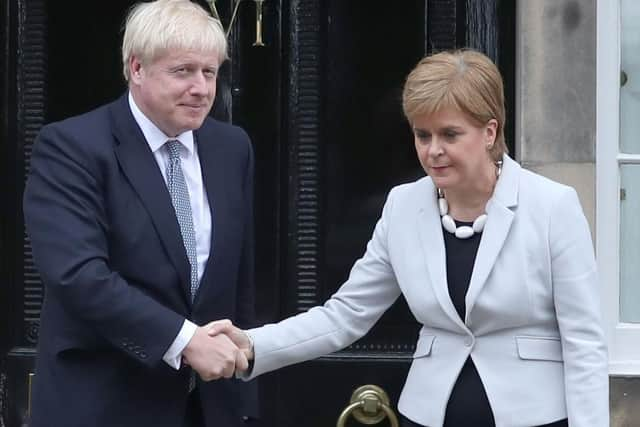Alex Kane: Boris Johnson needs to up his game in defence of Union


There can’t be a referendum on the constitutional future without the say-so of the UK government.
In the Scottish parliamentary election due in May (assuming, of course, it still goes ahead) the SNP is prioritising a second referendum and banking on a substantial overall majority of votes and seats. It has only had an overall majority once – in 2011, when it won 69 of the 125 seats – and three years later PM David Cameron agreed to an independence referendum.
Advertisement
Hide AdAdvertisement
Hide AdIf the SNP clears 70 or so seats and pushes the 2011 vote share of around 45% to over 50% it will demand Boris Johnson triggers the Section 30 order (which enables the Scottish Parliament to pass laws on issues usually reserved for Westminster) and kick-start the process for a second referendum. Johnson has already ruled this out: noting that, ‘the wait between the UK’s referendums on EEC/EU membership in 1975 and 2016 is a good sort of gap’. By that logic he thinks there shouldn’t be a referendum before 2055.


Some SNP strategists are in favour of a wildcat referendum if Johnson refuses an official one. In other words, the Scottish Parliament would go ahead with a referendum in open defiance of Westminster. But I’m not sure what that achieves if an election built on the demand for the referendum has already delivered an overall majority. Also, it’s almost certain the other parties would boycott such a referendum and the outcome would, in essence, be meaningless.
Whatever his views on Northern Ireland may be (I would describe them as laissez-faire at best) I’m pretty sure Johnson doesn’t want to be the prime minister who sees Scotland leave the Union under his watch. He will use every available tactic to save it even if, ironically, those tactics made him and the Conservatives even more unpopular in Scotland. He reckons the SNP would never go down the path of a unilateral declaration of independence, so he’s prepared to face them down.
The other thing Johnson will bear in mind is David Cameron’s near miss in 2014. He called that referendum because he was confident the No campaign would win: although, in the end, it required the intervention of Gordon Brown and others to secure victory. Cameron, never a man to learn lessons, tried the same thing with the 2016 EU referendum: but that time there was no one to ride to his rescue. The evidence suggests even Johnson thought Remain would win in 2016: but he was thinking about profile building then, rather than having to deal with the aftermath of an unexpected victory for Leave.
Advertisement
Hide AdAdvertisement
Hide AdBarring a collapse of the SNP vote and seat numbers in a few months time Johnson will be taking no risks with a referendum. All of which leaves the SNP in a limbo: angry with Johnson, yet wary of provoking the sort of constitutional crisis in which the always unpredictable prime minister might be tempted to use the UK Exchequer as a way of killing independence (or, at the very least, an immediate demand for it) with largesse.
Nationalists in Northern Ireland will be watching all of this with keen interest. The next key political/electoral battle will be the Assembly election due in the spring of 2022. In 2017 unionists (and I’m defining unionists as those with clear pro-Union preferences in their election literature) won 40 seats and about 46% of the vote. Non-unionists (those making it clear they were nationalist, or expressed no preference) won 50 seats and about 54% of the vote. Crucially, the unionist/nationalist split was about 46%-40%.
And the reason those figures are crucial is that they feed into how a secretary of state might conclude (as he is required to do in determining the calling of a border poll) a victory for a united Ireland in such a poll is ‘likely.’ So, while a 40-50 split in seat numbers tells you one thing and a 46%-54% split on unionist versus non-unionist tells you something else, it doesn’t give certainty on how a significant section of non-unionists (Alliance, Greens and smaller demographics) might vote in a border poll.
But what happens if the unionist/nationalist vote shifted in favour of nationalism in the Assembly election? What happens if Sinn Fein eclipses the DUP and Michelle O’Neill becomes the first Sinn Fein first minister? What happens if the unionists lose a few of the 40 seats they presently hold? Would any of that have an impact on how a secretary of state decides on the validity of a border poll? At this point we don’t know, because the Belfast Agreement doesn’t actually put much beef on the border poll bones.
Advertisement
Hide AdAdvertisement
Hide AdBut it might mean that Boris Johnson would face demands for referendums in Scotland and Wales based on nationalist progress in local elections in 2021/22. Would he treat those demands equally and dismiss both? Or would he say no to Scotland yet open the door to one in Northern Ireland? As it happens, my instinct is that the specific terms/conditions for a border poll will be set out fairly soon (but probably not before the Assembly election): buying him a little time and clearing some confusion here.
One thing is clear, this self-proclaimed PM of the ‘entire United Kingdom’ needs to up his game and start acting in the entire interests of the UK.
——— ———
A message from the Editor:
Thank you for reading this story on our website. While I have your attention, I also have an important request to make of you.
With the coronavirus lockdown having a major impact on many of our advertisers - and consequently the revenue we receive - we are more reliant than ever on you taking out a digital subscription.
Advertisement
Hide AdAdvertisement
Hide AdSubscribe to newsletter.co.uk and enjoy unlimited access to the best Northern Ireland and UK news and information online and on our app. With a digital subscription, you can read more than 5 articles, see fewer ads, enjoy faster load times, and get access to exclusive newsletters and content. Visit https://www.newsletter.co.uk/subscriptions now to sign up.
Our journalism costs money and we rely on advertising, print and digital revenues to help to support them. By supporting us, we are able to support you in providing trusted, fact-checked content for this website.
Alistair Bushe
Editor